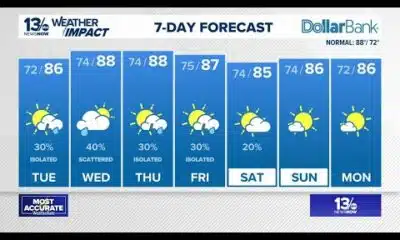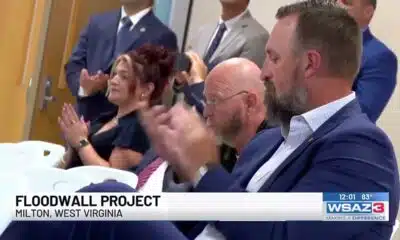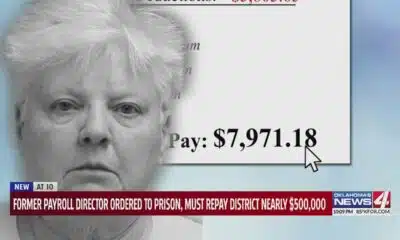News from the South - Florida News Feed
Sewage spills getting worse all over Florida, but funds for testing waterways are drying up
Sewage spills getting worse all over Florida, but funds for testing waterways are drying up
by Craig Pittman, Florida Phoenix
June 19, 2025
I’m visiting family in Pensacola this week, and I noticed that the local news has been focused on feces.
I don’t mean they’re cracking lots of poop jokes like SpongeBob SquarePants (“Oh, POOP, you never let us down.”) I mean they’ve been doing Very Serious Stories on how persistent sewage leaks are driving people in one high-end subdivision absolutely bonkers.
“Residents in a neighborhood off Scenic Highway estimate nearly a million gallons of sewage has been leaked into the Escambia Bay,” WEAR-TV reported recently. “Neighbors say this has happened more than half a dozen times in recent years.”
Pensacola is not the only Florida city whose name starts with a P that’s suffering from poopy water. In Palm Bay, over on the state’s east coast, a sewage line burst and spilled more than 3 million gallons of sewage into the bay.
These Florida sewer problems are popping (not pooping!) up more and more these days. Some smart folks have been warning us about it for years. Have we paid attention to the warnings? No, we have not, despite the dire impact these leaks have on our famous beaches.
An environmental organization called the Surfrider Foundation has been banging the drum like Buddy Rich to get our politicians to pay attention to our sewer problems. I called up Katie Bauman of Surfrider’s Florida office this week to ask if there had been any progress. No, she said.
“It continues to be a major problem in this state,” she told me.
Then she pointed out that both our fine Legislature and our current president seem to be working hard to make things much, much worse for us.
That’s not the kind of news that makes you feel flush with pride.
Everyone poops
There’s a popular children’s book called “Everyone Poops.” So far, no Florida school board has banned it from their library the way they have “And Tango Makes Three.”
That’s a good thing, because the book is telling the truth. Poop is a common human product, no matter what your wealth, class, or employment status may be.
If you don’t believe me, I refer you to a recent New York Times story about the South Florida island known as the “Billionaire’s Bunker,” where the likes of Jeff Bezos, Tom Brady, and Ivanka Trump have been wrangling with the nearby town of Surfside over their sewage disposal.
“In a place where many of the estates have more than 10 toilets, nobody has quite figured out how to dispose of what comes out of them,” the Times reported.
In Florida, the disposal choices are limited to septic tanks and sewer lines. Septic tanks tend to fail and leak into our waterways, fueling toxic algae blooms. That’s why people concerned about the future are trying to get as many folks as possible to stop using them and hook up to sewer lines.
But a lot of our sewer lines and sewer plants are so old they make the dinosaurs from Dinosaur World look like spring chickens, which means they’re prone to break.
“At the advent of the Clean Water Act, a lot of cities made use of the federal funding to build new sewer plants,” said Justin Bloom of Suncoast Waterkeeper, another environmental organization that’s been pushing for better sewage treatment.
Some cities and counties have done a good job of maintaining their sewer plants over the decades since the 1970s, he said, naming Sarasota County as one example
Some have not, he said, naming Bradenton. That selection was not a surprise since Bloom’s organization sued Bradenton in 2022 for releasing too much pollution into the Manatee River.
The big spill
The high-water mark (so to speak) for Florida’s sewer crisis news came after Fort Lauderdale produced the worst sewage spill in Florida history in 2020.
More than 126 million gallons of sewage gushed into streets, yards, and waterways. The South Florida Sun-Sentinel noted that amount was “enough to fill 192 Olympic-sized pools,” which is not the kind of pleasing mental image that Florida tourism promoters prefer.
The big spill opened the floodgates for lots of news stories that followed.
“Florida has recently experienced several large sewage spills,” the British paper The Guardian reported, “and the issue is expected to worsen in the state due to its growing population, urban development, the climate crisis and aging infrastructure that frequently cause existing wastewater systems to fail.”
“Data from the Florida Department of Environmental Protection show the number of sewage spills in the state has risen steadily over the past decade,” WUFT-FM reported.
Meanwhile, WLRN-FM found that the Fort Lauderdale spill was “a sign of infrastructure woes for other coastal cities.” The station amplified that message by adding this historical note:
“In the last five years, conditions have gotten so bad in South Florida that environmental regulators put three local governments under legal mandates — telling them how to fix the problems. Dozens of others have been cited by” the DEP.
That’s alarming news for a state that depends on clean water for both its seafood and tourism industries to thrive.
The newspaper Florida Today created a website that tracks all the sewage spills reported in Florida. I checked it this week. It showed so many dots for recent and ongoing spills that it looks like a dartboard that’s been hanging in an Irish pub since St. Patrick vanquished the snakes.
Sewers ain’t sexy
In addition to age, another major problem for all of Florida’s sewer plants is volume.
Because of Florida’s rampant, unchecked growth, a lot of the sewer systems are now handling (so to speak) a lot more wastewater than they were designed to handle.
We now have 23 million residents and more than 100 million annual visitors flushing toilets all over the state. As WLRN pointed out, it’s like the frequent traffic gridlock on our streets has been transferred to our sewer lines. In both cases, too much traffic leads to backups. Of course, one smells far worse than the other.
Then there is the complication of — shhh! don’t let the Legislature hear us talking about this! — climate change.
Not only are we seeing rising sea levels but our warming world is producing lots more precipitation for our stormwater drains to funnel into the sewers. Our rising sea level is pushing the underground aquifer level higher too, the Miami Herald recently reported.
“When tides rise, so too does that water underneath our streets and buildings — an effect that can extend far inland,” the newspaper noted. “Already, those higher groundwater levels have been linked with more intense floods, like those that have swamped homes and streets in Fort Lauderdale, Aventura or Hialeah in the last few years.”
Then one of our increasingly intense hurricanes, fueled by warmer Gulf waters, crashes ashore. That’s how we wind up with a lot of putrid water standing in everyone’s house and street. But it doesn’t take a hurricane to crash our sewer systems these days. Those are just the most dramatic breakdowns.
When increased flooding backs up an antiquated sewer system and breaks it, there’s a flurry of news coverage, but soon that goes away. Even the news coverage of the Michigan sewage lift station named for Florida Pulitzer-winner Dave Barry died down after a while.
Reporters and politicians go chasing after other subjects, and the sewer problem remains unresolved.
“It’s just not that sexy to work on sewage issues,” Bloom said.
But it sure should be, since it affects whether we can use our all-important beaches, a major attraction for tourists.
Testing the waters
One of the most important things that the Surfrider Foundation does in Florida is test the waters.
No, the Surfrider volunteers are not running around dipping their toes into the waves to check the temperature. They’re testing for fecal material that could make swimmers sick.
The Florida Department of Health runs a Healthy Beaches program that’s supposed to test all the waterways for contamination (more on that in a moment). An environmental group called Environment America compiled the state tests and found that, in 2022, 70% of Florida’s beaches tested positive for fecal contamination.
I’m terrible at math, but even I can see that’s a lot of beaches closed for contamination.
“People read that and think, ‘That’s not the place we should vacation this year,’” Bauman said.
Because the Health Department folks can’t cover every beach in Florida, Surfrider steps in to do testing by volunteers and post the results, Bauman told me. The effort is worthwhile because it can spare beachgoers from contracting a virus from the pollution.
“The public needs to know about this when they’re going for a swim,” she said.
Those Surfrider volunteers are needed more and more these days.
Before 2011, Bauman told me, the state and the feds worked together to pay for the Health Department’s water tests, putting up a total of $1 million a year.
But when Rick “I Live at the Beach But I Don’t Swim There” Scott was governor, the state quit putting up its half. Scott slashed every Florida environmental agency to the bone and even tried to sell off some of our parkland, so his hostility to testing for pollution should be no surprise.
The loss of the state funding left only $500,000 from the federal program to cover the cost. That led to “cuts to where and when the testing occurred,” she said.
It went from weekly to bi-weekly, Bauman said, and major stretches of the state’s coastline went completely untested.
“We’ve advocated for restoring the funding,” she said, “but once it’s cut out of the budget, it’s hard to get it back in again.”
Given that we now have the most anti-environment president in history back in the White House, you can probably guess what comes next.
The president’s proposed budget, Bauman said, calls for eliminating the federal half of the money for testing the waters.
If you’re scoring this at home, that takes the funding for beach testing in Florida from $1 million in 2010 to half that after 2011 to nothing starting this year. Zero. Zip. Nada.
If this budget passes Congress, I think the only tourists who’d want to visit a Florida beach would be the weirdos who cosplay as the Ty-D-Bowl Man.
The poop on how to fix this
I don’t want you to think all of Florida’s politicians are insane in the membrane when it comes to Florida’s escalating sewer crisis.
Just last year, the Legislature voted to pass a bill called the Safe Waterways Act. The bill was designed to create a statewide system under the Department of Health to send warnings and issue beach, canal, and pool closures within 24 hours of the discovery of dangerous pollution problems.
The goal of the bill was to create a streamlined system for reporting contaminated waterways and swimming spots. Isn’t that great? You can see why it was so popular that every single legislator voted for it, no matter what their party label.
But then it landed on the desk of the one governor in Florida history who seems to really detest clean water. Maybe he’s just looking for any excuse to wear his white go-go boots again.
With or without his boots, Ron DeSantis always seems eager to bigfoot local government. But he vetoed this bill because, he said, it gave a state agency the power over decisions about closing beaches that should be left entirely up to counties and cities. Given his loud objections to things that smell bad, I was surprised at the veto.
Sponsors refiled the bill this year, but this time around they couldn’t get any traction.
I suspect this common-sense measure ran into a roadblock because some folks didn’t want all the bad publicity from having so many beaches being closed at once. Picture the mayor from “Jaws” hurrying to reopen the beach at Amity Island before any more scared vacationers leave.
I have a possible solution for this problem of politicians not taking our sewer crisis seriously. I think we should learn from what happened to Dave Barry and rename our clanking, clattering old sewer plants for the poopyheads who have been ignoring the danger here.
Then, when the plant breaks, I picture the local TV news reporting: “The fecal material that’s stinking up the neighborhood is coming from the Ron DeSantis Wastewater Plant.” Or how about: “Millions of gallons of raw sewage have been seen spewing from the Donald J. Trump Wastewater Plant, which officials said was very old.”
I bet that would get their attention and they would hurry to fix the problem. If this works, then we can all join with SpongeBob and say, “Oh, poop, you never let us down!”
YOU MAKE OUR WORK POSSIBLE.
Florida Phoenix is part of States Newsroom, a nonprofit news network supported by grants and a coalition of donors as a 501c(3) public charity. Florida Phoenix maintains editorial independence. Contact Editor Michael Moline for questions: info@floridaphoenix.com.
The post Sewage spills getting worse all over Florida, but funds for testing waterways are drying up appeared first on floridaphoenix.com
Note: The following A.I. based commentary is not part of the original article, reproduced above, but is offered in the hopes that it will promote greater media literacy and critical thinking, by making any potential bias more visible to the reader –Staff Editor.
Political Bias Rating: Center-Left
This content emphasizes environmental concerns, criticizing politicians—particularly conservative figures like Ron DeSantis and Rick Scott—for insufficient action on sewage infrastructure and pollution in Florida. It supports increased government intervention and funding for environmental protection, which aligns with Center-Left perspectives that prioritize ecological sustainability and public health. However, it maintains a generally fact-based, issue-focused tone without broad partisan attacks, reflecting a moderately progressive stance rather than far-left ideology.
News from the South - Florida News Feed
Here's what you can do to get enough protein in your diet
SUMMARY: Protein is crucial for a healthy lifestyle, with many Americans prioritizing it in their diets, boosting the market for protein-enriched snacks like popcorn, chips, and even donuts. Registered dietitian Monica Auslander Moreno suggests most adults need about 0.8 grams of protein per kilogram of body weight daily, though many experts recommend more due to strength training. Protein quality matters, with eggs and whey scoring highest on the PDCAAS scale. Fitness trainers advise sticking to whole foods like steak, chicken, and eggs, using protein snacks as convenient alternatives—not full meal replacements—for maintaining health and fitness goals.
Once the domain of bodybuilders and athletes, protein has moved to the center of many Americans’ daily diets, showing up in everything from cereal to doughnuts, according to nutrition experts.
For video licensing inquiries, contact: licensing@veritone.com
News from the South - Florida News Feed
Sudan’s Rapid Support Forces kill 40 people in North Darfur displacement camp attack
SUMMARY: Sudan’s paramilitary Rapid Support Forces (RSF) attacked the famine-stricken Abu Shouk displacement camp near el-Fasher, North Darfur, killing 40 people and injuring 19, according to local rights groups. The camp, housing approximately 450,000 displaced individuals, has faced repeated assaults during Sudan’s ongoing civil war between the RSF and the Sudanese military since April 2023. The Sudanese army reported repelling RSF attacks in el-Fasher, destroying vehicles and capturing equipment. Meanwhile, the RSF displaced over 3,000 families in North Kordofan, looting properties. The conflict has killed over 40,000, displaced 12 million, and worsened famine conditions in the region.
The post Sudan’s Rapid Support Forces kill 40 people in North Darfur displacement camp attack appeared first on www.news4jax.com
News from the South - Florida News Feed
Ousted FDA vaccine chief Vinay Prasad is returning to the agency
SUMMARY: Dr. Vinay Prasad is reinstated as the FDA’s top vaccine regulator after stepping down due to pressure from biotech executives, patient groups, and conservative allies of former President Trump. Prasad had drawn criticism for past comments against Trump and for temporarily halting a gene therapy for Duchenne muscular dystrophy after patient deaths, a move opposed by families and libertarians. Despite backlash, including from right-wing activists like Laura Loomer, Prasad enjoys support from FDA Commissioner Marty Makary and Health Secretary Robert F. Kennedy Jr. He has implemented stricter COVID-19 vaccine approval standards, limiting new shots from Novavax and Moderna.
The post Ousted FDA vaccine chief Vinay Prasad is returning to the agency appeared first on www.clickorlando.com
-
News from the South - Oklahoma News Feed2 days ago
Former payroll director ordered to prison, must repay district nearly $500,000
-
News from the South - North Carolina News Feed5 days ago
Two people unaccounted for in Spring Lake after flash flooding
-
Mississippi Today7 days ago
Brain drain: Mother understands her daughters’ decisions to leave Mississippi
-
News from the South - Texas News Feed3 days ago
Jim Lovell, Apollo 13 moon mission leader, dies at 97
-
News from the South - Tennessee News Feed4 days ago
Trump’s new tariffs take effect. Here’s how Tennesseans could be impacted
-
News from the South - Florida News Feed7 days ago
SCOTUS order in Louisiana case could affect Alabama redistricting battle
-
News from the South - North Carolina News Feed7 days ago
Review board recommends no charter for Agape Achievement Academy | North Carolina
-
Mississippi News Video7 days ago
Great American Farmers Market










































